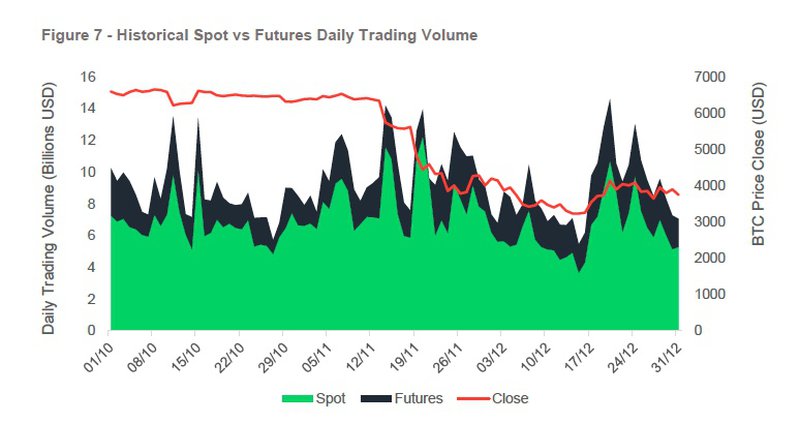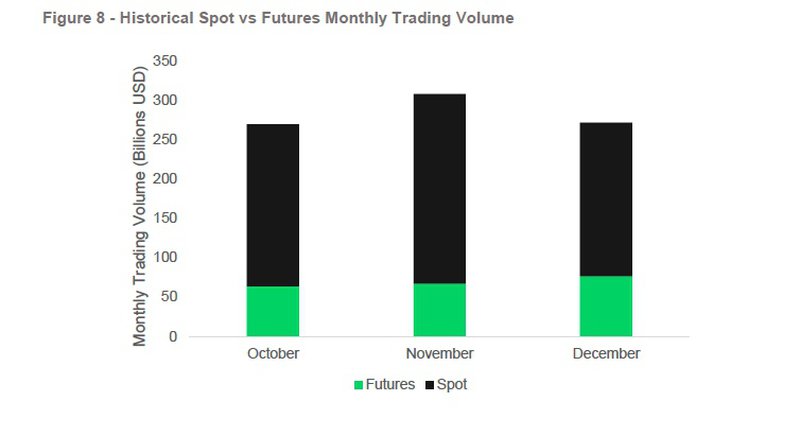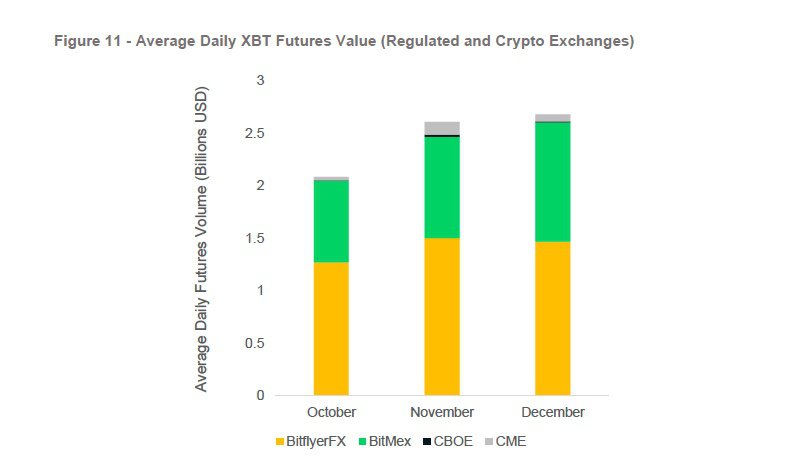According to new data provided by CryptoCompare in its monthly Exchange Review, while the general volume of BTC trading was generally down during December, Futures trading grabbed an increased share of that volume, and actually increased in value.
Having experienced significant spikes in volume during November, as the price of bitcoin fell through the $6,000 support it enjoyed through mid-late 2018, trading tailed off steadily early in December. As the price of BTC slowly descended from around $4,000 so did daily volumes, according to the crypto data providers’ aggregated figures. This calm start to the month saw an overall drop of $37bn in Trading Volume between the two periods, down from a total of $308 billon in November to $271 billion in the last month of 2018.
However, the relative calm was broken by explosions in trading that punctuated the middle of the month, as the most-traded crypto-asset began to recover from a year-low of $3,169, which it hit on December 15th. The ensuing six-day rally, that saw BTC re-break the $4,000 barrier, a level that it struggled and eventually failed to hold over the Christmas period, bought the first of two big leaps in volume before interest tailed off again towards the new year.

What can be seen in the in the chart above, however, is interesting. It reveals that, as volumes spiked, the boost in the amount of trading in futures contracts exceeded that of spot trading. Ultimately, this amounted to the market for the ‘Perpetual Swap’ derivative instruments offered by Seychelles-based BitMEX and the Japanese exchange BitFlyer, growing from $67 billion in November to $76.3 billion in December – upping their percentage of total bitcoin-related volume from 22% to 28%.

BitMEX’s XBTUSD (XBT is the BitMEX ticker for Bitcoin) perpetual swaps, which allow traders to take either short or long positions on the future price of bitcoin, saw a 17.7% increase in volume. BitFlyer’s XBTJPY (Japanese Yen) swaps, however, exceeded the value of BitMEX’s, surpassing the XBTUSD daily volumes by around 50% after conversion.

In terms of the USD market, however, trading in BitMEX’s swaps massively outweighs the more traditional cash-settled Bitcoin futures offered by the Chicago Mercantile Exchange (CME) and the Chicago Board of Exchange (CBoE), both of which are US-based and regulated. As the chart above – where they are the black and grey bands respectively – shows, after a tumultuous November, those two services saw respective 45.5% and 48% drop-offs in volume for their XBTUSD futures.
So, while BitMEX’s daily contract volume grew from an average of $964 million USD in November to $1.13 billion in December, CME’s average daily trading decreased to $66.5 Million. CBOE managed an average volume of just $10.65 million per day across the same period.
That means, the regulated exchanges represented little more than 6% of the XBTUSD futures market compared to those of BitMex (93.64%) in December, a drop from 12.86% in November. Add in converted values for BitFlyer, and that slice drops to a little under 3%.
The popularity of BitMEX’s and BitFlyer’s perpetual swaps are beginning to be echoed across the industry, only last month OKEx – a Malta-registered exchange that, according to CryptoCompare, is the 2nd-ranked exchange in the world by Average Daily Volume – launched its own version of BitMEX’s derivative, which it is offering to traders alongside more traditional futures instruments. Its options – which, like BitMEX also cover multiple crypto-assets alongside bitcoin – began to come online in early December, so it will be interesting to see what kind of percentage it can carve from the incumbent’s share of the market in the coming months.
The New York stock exchange-backed Bakkt, is also using a variant of the Bitcoin future derivative as its opening offering to crypto investors. It will be pricing a daily settled, physically delivered, Bitcoin futures contract that will result in the delivery of the BTC at the end of the contract day – in contrast to the rolling nature of the cash-settled perpetual swap concept, which simply debits or credits the difference between the contract price and the spot price at allowed times.







